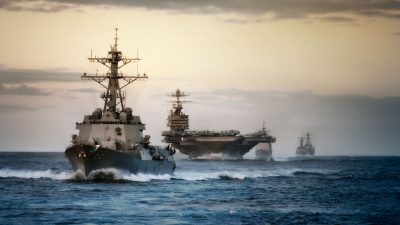Large-Scale US Naval Exercise: Desperate Attempt to Demonstrate Global Power

All Global Research articles can be read in 51 languages by activating the “Translate Website” drop down menu on the top banner of our home page (Desktop version).
Visit and follow us on Instagram at @crg_globalresearch.
***
On August 3, the U.S. began its largest naval exercise in the last 40 years, the Large-Scale Exercise 2021. It involves five naval formations and the Marine Corps across 17 time zones. Another 25,000 soldiers are also participating in the exercise that will end on August 16. According to Stars and Stripes, the last comparable exercise of this magnitude was the 1981 NATO Ocean Venture.
The aim of Large-Scale Exercise 2021 (LSE) is to practice naval battles over a large area, as well as to identify, detect and destroy the enemy at sea, including the destruction of their nuclear weapons. It is a return to the Cold War and is meant to be a demonstration of power against Russia and China showing that the U.S. can carry out combat actions on several fronts simultaneously.
American strategists believe it is possible to defeat a sophisticated enemy on a single order with high-precision simultaneous blows from air, land, sea, space and cyberspace
Vice Admiral Gene Black, the commander of the 6th U.S. Fleet, said:
“LSE will test our commanders across the spectrum of naval warfare from the tactical to the strategic, integrating the Marine Corps to demonstrate the world-wide fleet’s ability to conduct coordinated operations from the open ocean to the littoral.”
However, serious doubts exist about the U.S.’ ability to dominate the Black, Mediterranean, South China, and East China Seas, as well as the world’s oceans. In terms of number and quality, the U.S. Navy is beginning to decline as they rank only fourth in the world for the total number of units (490) – the Chinese navy has 777 units, Russia 603 and North Korea 492. According to the Pentagon, there are 297 warships in the U.S. Navy, while China has 335 surface ships.
LSE 2021 is likely a reaction to the failed Pentagon-organized secret strategy simulation in October 2020. According to the deputy head of the staff committee, General John Hyten, last year’s war games “failed miserably” as a capable adversary could achieve “information dominance.” The Pentagon was not prepared to operate in a decentralized environment, especially as high-tech armed conflicts has altered the battlefield.
The head of the naval operations of the U.S. Navy, Admiral Michael Gilday, said yesterday that the LSE 2021 exercise is an opportunity to experiment with the concepts of war to learn lessons for the coming years.
“It’s to take this warfighting concept, which is quite frankly going to be foundational to everything that we buy, everything we invest in, and it’s going to inform how we’re going to fight,” he said.
The commander of the U.S. Pacific Fleet, Admiral Christopher Grady, said he intends to “advance the art and science of naval warfare” during LSE 2021 by evaluating experimental technologies, particularly data, weapons and platforms in places around the world that are disputed.
This sentiment was shared by the Chairman of the U.S. General Staff, General Mark Milley, who said on August 2 that in order to prepare for war, the U.S. must assimilate 50 new technologies in the next decade, including drones with artificial intelligence.
It is likely that U.S. military leaders believe that Russia and China will be intimidated by the volume of investments and level of training that American forces are undertaking across the globe. However, the U.S. is massively overstretched, especially since the cost of war against Afghanistan and Iraq since 2001 has chewed up trillions of dollars, contributing to the astronomical debt that the country has accumulated.
The Russian military showed Britain in June near Crimea that it is willing to take all necessary steps to protect its sovereignty against provocations and/or intentional violations. Albeit this was directly against Britain, it was undoubtedly a message to Washington as well. Similarly, the U.S. also engages in hostile actions in the South China and East China Seas in their attempt to pressure and contain China. In the same manner, China frequently has to demonstrate its resolve and determination to not be bullied and contained within their own neighborhood by a foreign power.
The LSE 2021 exercise is undoubtedly huge and attempts to portray the U.S. as still being the preeminent global power. However, with the U.S. wasting the advantage of a unipolar world by being bogged down in Iraq and Afghanistan, it has allowed China and Russia to develop economically and militarily after the catastrophic years of the 1980’s and 1990’s. Now, both countries can challenge the U.S.’ desire for complete global hegemony.
*
Note to readers: Please click the share buttons above or below. Follow us on Instagram, @crg_globalresearch. Forward this article to your email lists. Crosspost on your blog site, internet forums. etc.
Paul Antonopoulos is an independent geopolitical analyst.
Featured image: Warships of the U.S. Navy. (Photo credit: U.S. Navy)

